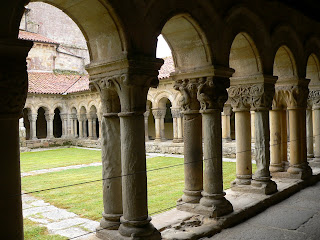Once inside, the profound stillness of the cloister brought all nine women to a standstill. It was such a simple plan: a sheltered walkway surrounding a quadrangle of paired columns that in turn surrounded a lawn bisected by stone paths into four smaller quadrangles. Only after stopping to truly look would one notice that the pattern was not symmetrical. There were some groups of four columns. One gate. One arched double window with a roof higher than the rest of the wood-ceilinged perimeter. Many of the columns’ capitals were distinct, with arcane or obvious designs. Some patterns appeared only once. Others were repeated.
And none of this mattered to Mirari. Easing herself into the center of the lawn, the intersection of the stone paths, she raised her hands to the open sky in a manner that compelled the others to both attention and silence.
With unmistakable gestures, she directed Ma and Emma to stand on the north side, each under separate arcs of stone. Beryl and Hazel found their respective places on the west side. Zoe and Edna on the south. Mim and Nana on the east.
When all were positioned, standing (as Mim knew they should not) on the low stone wall supporting the columns, Mirari began to hum.
Instinctively, the others followed suit; with sounds first tentative then clear. Except for Nana, who had ruined her voice by smoking. Instead, she whistled softly. The combined sounds curled around the 900 year old structure, mingling with the prayers of medieval nuns and the thud of dancing feet from Mirari’s people. And the faint echoes of the interim faithful.
Then Mirari began to clap, very softly, turning in place to face each of the other women. And each of the other women responded by clapping softly until the cloister sounded vaguely like the waves on the seashore only a few miles away.
And they rode that sound in a way that connected the nine of them as they had not been connected before. And simultaneously they understood the power of the El Castillo ceremonies.
But it was inevitable. The church bells began tolling 7 o’clock. The grumpy guardian opened the door to shoo them out through the church and back into the village.
And they went. Muttering in unison: “I don’t want to leave.”





No comments:
Post a Comment